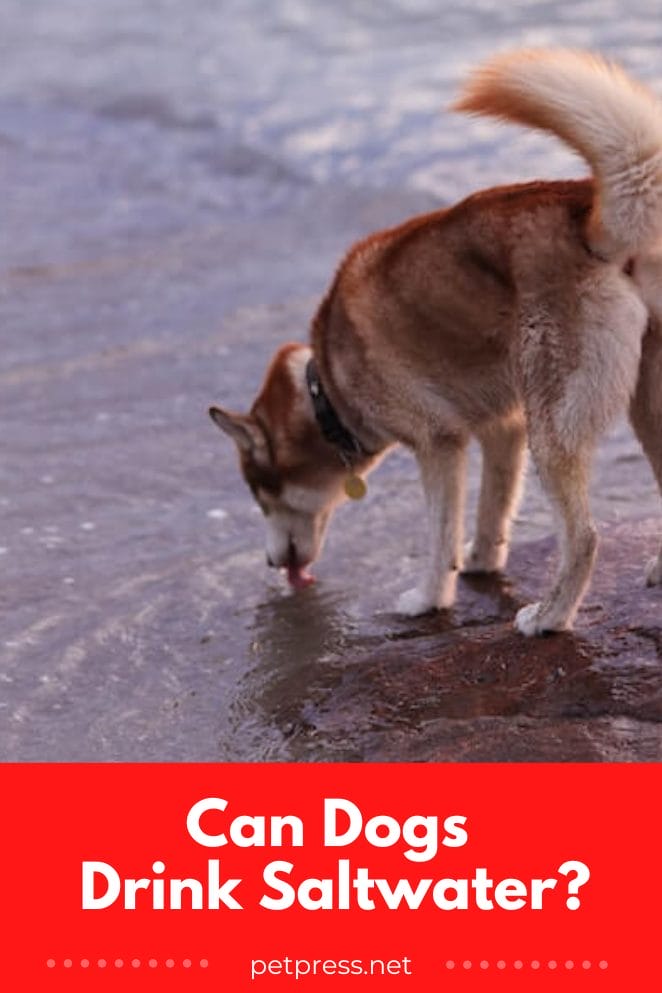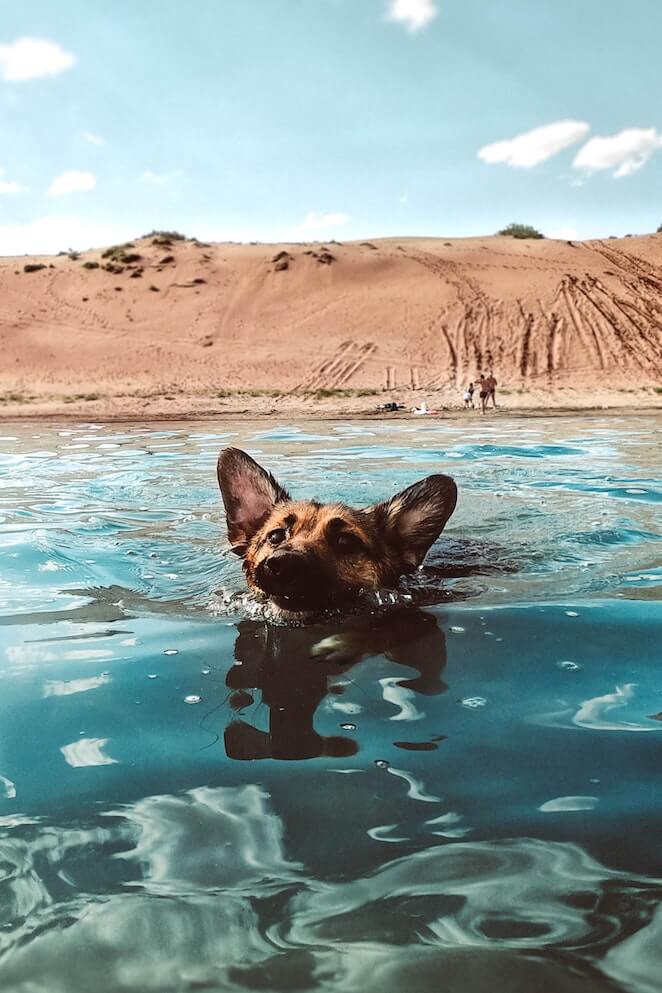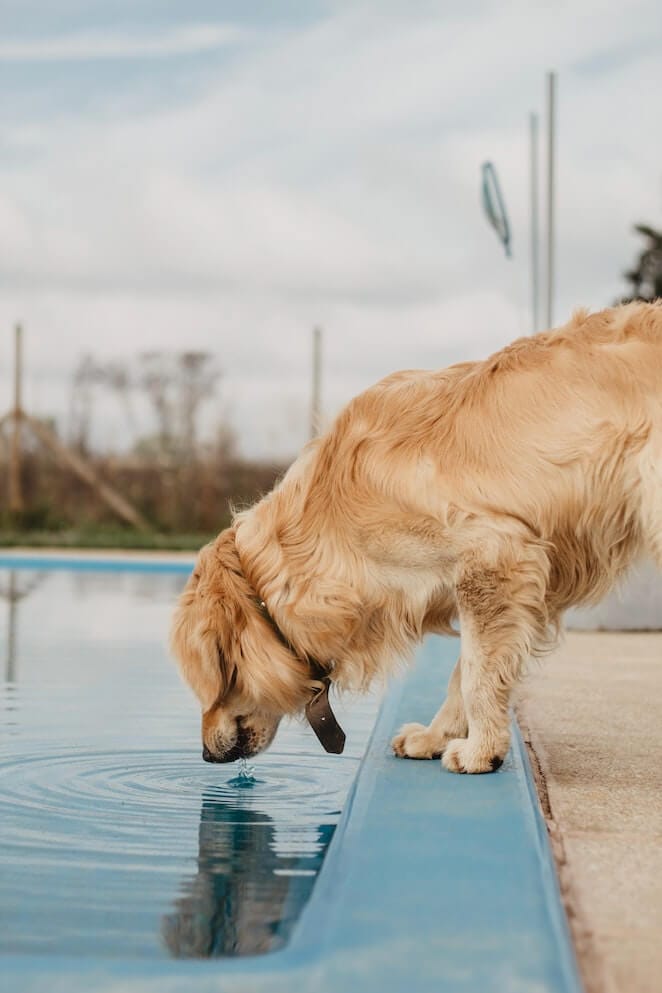
It’s a common question among dog owners: can dogs drink saltwater?
The answer to this is no, they can’t. Saltwater can be very dangerous for our canine companions.
While small doses of salty ocean water can typically be tolerated by healthy dogs, drinking too much can lead to a host of health issues.
Let’s learn more about the symptoms of saltwater poisoning and ways of preventing dogs from drinking salt water.
Can Dogs Drink Saltwater?

Technically, dogs can drink salt water and can even survive on it for a short period of time.
However, that doesn’t mean it’s safe or recommended for them to do so!
Saltwater can actually be quite dangerous for your pup as it can lead to dehydration and electrolyte imbalance. Both of these have potentially serious medical issues if left untreated.
So though technically possible, drinking saltwater should always be avoided by our canine companions!
In most cases, fresh water is available and should always be the preferred choice for your pup.
Fresh water helps with digestion, and temperature regulation and can help prevent illnesses like parvovirus.
If fresh water is not available, distilled or filtered water can be a good substitute.
In any case, it’s always better to err on the side of caution and provide your furry friend with the safest option; pure, clean drinking water!
Why do dogs drink salt water?

Have you ever wondered why your pup loves licking up salt water from the beach? It’s not just because it tastes good—there are actually several reasons why dogs drink salt water.
One of the main reasons is that sodium helps to replenish electrolytes, which can help keep a dog’s body functioning properly.
If your pup spends a lot of time outdoors in the summer, it may be losing more electrolytes than usual due to sweating and panting – drinking salt water can help her get them back.
Also, when dogs consume too much fresh water, they run the risk of diluting their blood and causing an imbalance in their sodium levels – so drinking salt water can help prevent this as well.
But this is a very temporary fix and it is not recommended to encourage this behavior in dogs.
This brings us to the next question asked by most dog parents.
What do I do if my dog drinks salt water?

By following these tips, you can help ensure that your pup doesn’t drink any saltwater while out and about!
1. Keep Your Dog Away from the Shore:
If possible, keep your pup away from the shoreline to prevent them from drinking salt water. If you must bring your dog to the beach, make sure they have plenty of fresh water available.
Don’t let them wander too far away from you.
2. Bring Bottled Water for Your Dog:
Pack bottled water for your pup so that he or she always has access to fresh, clean water when at the beach or lake. Make sure to provide enough for multiple trips throughout the day if necessary!
Compromising dog food or water is a very common dog-parent mistake that must be avoided at any cost.
3. Don’t Leave a Bowl Out:
You may think it would be convenient to leave a bowl of fresh water out while playing in the ocean or at the lake but doing so can be inviting for your pup to lap up some salty water.
Don’t leave an open bowl of fresh water unattended and only give them access when supervised.
4. Keep an Eye Out:
Monitor your pup while they’re playing near any kind of body of water, even if it isn’t saltwater, as you don’t want them drinking from any suspicious-looking puddles or pools!
5. Educate Your Dog:
Dogs are intelligent creatures and can be trained not to drink salt water.
Start by teaching them basic commands like “no” and “leave it,” so that you can easily redirect their attention away from the salty water. The more you practice, the better they’ll be at understanding what not to do.
Symptoms of Saltwater Poisoning in Dogs

Look out for these symptoms in your dog if it has ingested salt water after a day on the beach:
1. Nausea and Vomiting:
Dogs who ingest too much salt water can become nauseous, leading to vomiting. This is because salt affects the stomach lining and causes it to become inflamed and irritated, causing gastric distress.
2. Diarrhea:
Saltwater poisoning can also cause diarrhea in dogs due to the irritation of the digestive tract from the salty water.
Diarrhea may be accompanied by a sour smell as well as mucus or blood in the stools depending on how severe the dehydration is.
3. Increased Thirst:
One symptom of saltwater poisoning in dogs is an increased thirst due to dehydration caused by drinking too much salt water or being exposed to it for long periods of time.
Dogs will try to drink more and more water in order to replace the fluids that have been lost.
4. Lethargy:
Another symptom of saltwater poisoning is lethargy or a feeling of sluggishness due to dehydration and the loss of electrolytes such as sodium, potassium, and chloride.
This can cause them to feel weak and exhausted, making it difficult for them to move around.
5. Tremors:
Saltwater poisoning can also cause dogs to experience tremors due to an imbalance in electrolytes caused by drinking too much salt water or being exposed to it for long periods of time.
The tremors may be mild or severe depending on how much saltwater was ingested and how severely the body has been affected.
Final Thoughts
In conclusion, it is important to see a vet immediately if you suspect your dog may be suffering from saltwater poisoning.
Early diagnosis and treatment can prevent serious health problems or even death. If caught early, the symptoms of saltwater poisoning can be managed and reversed with proper medical care.
It is always best to take proactive steps in preventing saltwater poisoning by keeping your dog away from salty water sources and supervising their time by the beach or pool.
Every dog parent should be careful while taking a dog to the beach to avoid any health hazards.
This will help ensure that they remain safe and healthy for years to come!
- 7 Dog Breeds With Webbed Feet And Why Do They Have Them - July 19, 2023
- 10 Best Fish For Small Tanks That Make Perfect Pets - July 18, 2023
- How to Breed Guinea Pigs: A Detailed Guide - July 17, 2023


GIPHY App Key not set. Please check settings